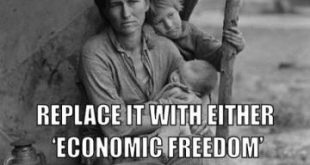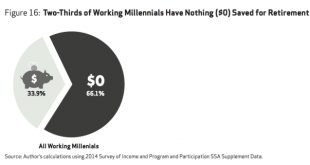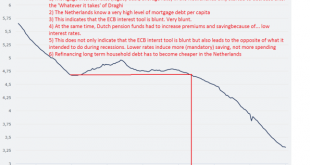from Dean Baker The explosion in the pay of corporate CEOs is well documented. While the heads of major corporations were always well paid, we saw their pay go from 20- to 30-times the pay of ordinary workers in the 1960s and 1970s to 200- or 300-times the pay of ordinary workers in recent years. Paychecks of more than $20 million a year are now standard, and it’s not uncommon to see a top executive haul in more than $40 or $50 million in a single year. Soaring CEO pay is an important...
Read More »The Coca-Cola theory of happiness
from Asad Zaman The root cause of our hopelessly defective economic theories is a fundamentally misguided model of human behavior. Modern economic theory assesses the impact of policies by replacing all human beings with homo economicus, which is a brain connected to a mouth and stomach. Because the heart and soul of human beings is removed from the picture before the economist begins his calculations, economists are routinely baffled by behavioral economics, based on actual behavior...
Read More »McCloskeyian rhetoric
from Lars Syll This is not new to most of you of course. You are already steeped in McCloskey’s Rhetoric. Or you ought to be. After all economists are simply telling stories about the economy. Sometimes we are taken in. Sometimes we are not. Unfortunately McCloskey herself gets a little too caught up in her stories. As in her explanation as to how she can be both a feminist and a free market economist: “The market is the great liberator of women; it has not been the state, which is after...
Read More »Millennials’ retirement plan: socialism?
from David Ruccio Millennials may be the largest, best educated, and most diverse generation in U.S. history. But they’re also generation screwed. As a result, they’re more likely than their elders to think of themselves as working-class and less likely to identify as middle-class. The large downshift in class identity among young adults is explained by the fact that they are being left behind—with lower earnings, fewer jobs, more part-time employment, and a higher unemployment rate...
Read More »issue no. 83 of the real-world economics review
download whole issue Ten years after the crisis: a lost decade? 2Steven Pressman and Robert Scott download pdf The great marginalization: why twentieth century economists neglected inequality 20Eli Cook download pdf Game Theory On the current state of game theory 35 Bernard Guerrien download pdf Why game theory never will be anything but a footnote in the history of social science 45 Lars Pålsson...
Read More »What do economic models explain?
from Lars Syll In my view, scientific theories are not to be considered ‘true’ or ‘false.’ In constructing such a theory, we are not trying to get at the truth, or even to approximate to it: rather, we are trying to organize our thoughts and observations in a useful manner. Robert Aumann What ‘Nobel prize’-winning economist Robert Aumann and other mainstream economics defenders of scientific storytelling ‘forget’ is that potential explanatory power achieved in thought experimental models...
Read More »Kudlow’s fossilized beliefs could lead Trump further astray
from Dean Baker Last week the Trump administration announced that it was picking Larry Kudlow as the new head of the National Economic Council .Kudlow was a mid-level official in the Reagan administration before moving to Wall Street, but his greatest notoriety came as an economics talk show host for two decades. Kudlow made no bones about his views on his show. (Full disclosure: I was an occasional guest.) He began each segment by proclaiming his belief in free markets, free trade and...
Read More »Utopia and epistemology
from David Ruccio It was Paul Samuelson who, in 1997, declared with morbid optimism that “Funeral by funeral, economics does make progress.”* What Samuelson presumed is that, over time, wrong ideas would be killed and laid to rest and better ideas would flourish, thus creating the foundation for progress in economic thought. That’s what I consider to be the epistemological utopianism of mainstream economic thought: using the correct scientific methods, the work that economists do gets...
Read More »Game theory — a severe case of ‘as if’ Model Platonism
from Lars Syll The critic may respond that the game theorist’s victory in the debate is at best Pyrrhic, since it is bought at the cost of reducing the propositions of game theory to the status of ‘mere’ tautologies. But such an accusation disturbs the game theorist not in the least. There is nothing a game theorist would like better than for his propositions to be entitled to the status of tautologies, just like proper mathematical theorems. Ken Binmore When applying deductivist thinking...
Read More »The interest rates. An institutional view.
Only after Mario Draghi’s ‘Whatever it takes’ (26 July 2012) low ECB policy interest rates started to translate decisively to lower rates for Mediterranean Eurozone borrowers. But ‘WIT’ did not only save (or at least: made live a little easier for) Italian and Spanish borrowers with legacy debts. Somehow, Dutch mortgage rates were also tied to the European bond rate instead of the ECB rate oor Dutch government bond rates (second graph) which meant that it was only after 26 July 2012, four...
Read More » Real-World Economics Review
Real-World Economics Review





